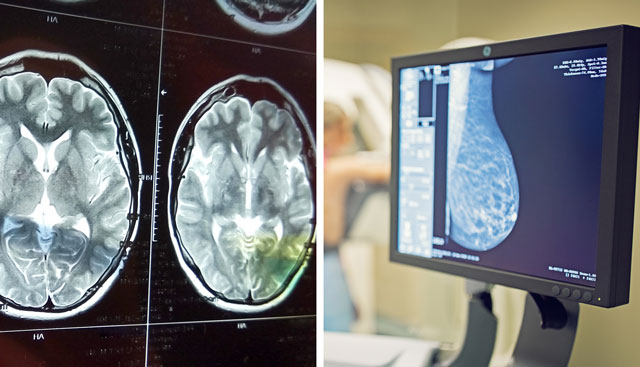
Advances in Breast Cancer Immunotherapy Research for Brain-Metastatic Breast Cancer
A new grant from the Department of Defense (DoD) will help advance immunotherapy research for brain-metastatic breast cancer patients. The four-year, $8.3 million Breakthrough Award from the DoD’s Breast Cancer Research Program will fund a phase 2 clinical trial led by Brian Czerniecki, M.D., Ph.D., chair of Moffitt’s Breast Cancer Oncology Department.
The first-of-its-kind trial,which will begin accruing patients next year, will evaluate the efficacy of a three-part treatment strategy utilizing immunotherapy that includes:
- A dendritic cell vaccine developed by Czerniecki in collaboration with Pawel Kalinski, M.D., Ph.D. of Roswell Park Comprehensive Cancer Center in Buffalo, N.Y.
- Chemokine modulation adjuvant therapy with rintatolimod (Ampligen) and interferon alfa-2B (Intron A)
- Immune checkpoint inhibition
“There are very few treatment options for breast cancer patients who have brain metastasis to the central nervous system. We know these three immunotherapies alone work well for a small number of patients, but our preclinical studies suggest that using them together in a three-pronged approach could increase tumor visibility to the immune system and in turn work to shrink the cancer,” said Czerniecki.
Roughly 10% to 15% of women with Stage IV breast cancer develop brain metastases. The trial will begin first in patients with localized brain-metastatic breast cancer (BMBC) that is not widely spread, and then expand to include patients with disseminated, leptomeningeal BMBC.
“The current treatments available for patients with brain-metastatic breast cancer are surgery, chemotherapy and radiotherapy. None are curative and all can have harmful side effects. Immunotherapy has the potential to reduce tumor size with little effect to a patient’s quality of life,” said Peter Forsyth, M.D., chair of Moffitt’s Neuro-Oncology Department and co-principal investigator for the BMBC trial.
